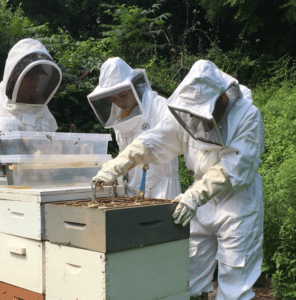At The Corps Network’s annual National Conference in Washington, DC, we celebrate the important service Corps provide to communities and young people across the country by honoring Corps who have taken on especially noteworthy endeavors within the past year. Projects of the Year are innovative and show a Corps’ ability to work with partner organizations to give Corpsmembers a positive experience and provide the community with meaningful improvements.

In recent years, several Corps across the country have launched successful farming and gardening programs. Plants don’t grow, however, without the help of pollinators. No Corps has pursued a pollinator program quite like New Jersey Youth Corps of Phillipsburg (NJYCP).
Located on the outskirts of Phillipsburg, NJYCP has the perfect environment to introduce Corpsmembers to sustainable agriculture. Aiming to create a comprehensive program that incorporates all phases of the food production process, NJYCP eventually recognized the need to integrate pollinators. To that end, the Corps began researching what it would take to engage Corpsmembers in the ancient practice of “apiculture,” or beekeeping.
Since NJYCP started in 1998, they have largely relied upon the knowledge of staff members to determine the types of projects they undertake. This approach led the Corps to projects in landscaping, ecological restoration, trail work, and light construction. Nobody on staff had ever practiced beekeeping.
To make this program a success, NJYCP turned to the community and discovered abundant local resources and enthusiasm. A farmer donated abandoned bee hives; the local 4-H representative volunteered her time and shared her experiences as a hobby apiculturist; a representative from NJ Audubon offered guidance to help improve local habitats for pollinators. Through conversations with the community, the Corps also realized they weren’t quite as new to this work as they thought: launching the beekeeping operation drew upon NJYCP’s existing project experience.
Corpsmembers practiced their woodworking skills by restoring old hives and building new ones. They learned about native species and gardening through planning and installing pollinator-friendly garden beds. Lastly, Corpsmembers learned about sustainability. The Corps created quite the “buzz” in the local community as a source for raw honey, but, being new to beekeeping, they had to decline many inquiries. Corpsmembers conservatively helped harvest just over 40 pounds of honey in 2019 (doubling the harvest from 2018). In beekeeping, it is important to ensure the bees have enough food to survive the winter. The Corps resisted the urge to extract any more honey than necessary.
Over the past calendar year, thirty Corpsmembers tallied over 1,100 hours on Plan “Bee.” Eighty-seven percent of those participants successfully completed the NJYC program. Of those that successfully completed, 96 percent secured employment, entered college or enrolled in another training program.
During this past year, the bees ranged to help pollinate 12 square miles (an area 3.5 times the size of the town of Phillipsburg). This includes the old farmland where Corpsmembers grow and harvest vegetables. Since starting Plan Bee, the farm has never seen such large yields. This season, output increased by a third. With the surplus, the Corps donated vegetables through a farm stand and gave more than 200 pounds of produce to the local food bank. This initiative has given NJYCP a platform to raise awareness about pollinators and sustainability.
Keeping bees has been rewarding and educational for Corpsmembers and the Corps. NJYCP is a “second chance” program for young people who have not completed high school; it was Corpsmembers who coined the term Plan “Bee.” Throughout this initiative, there have been countless opportunities for reflection and teaching. There are parallels between the structure and health of a bee colony and the operations of our own society.
Though many Corpsmembers initially balked at the idea of working with bees, they were empowered with knowledge and overcame these fears. Corpsmembers feel a sense of responsibility in recognizing that the success of the bees could depend on them; making small adjustments can improve the well-being of the colony. The same is often true for people. Everyone at NJYCP has gained appreciation for these little pollinators and the herculean tasks they perform that ultimately help sustain our own lives.
“In being mindful and purposeful in our approach, we can support any community by tending to its needs equitably…Communities thrive when they are tended to and taken care of.” – Michael Muckle, Director, New Jersey Youth Corps of Phillipsburg




































































